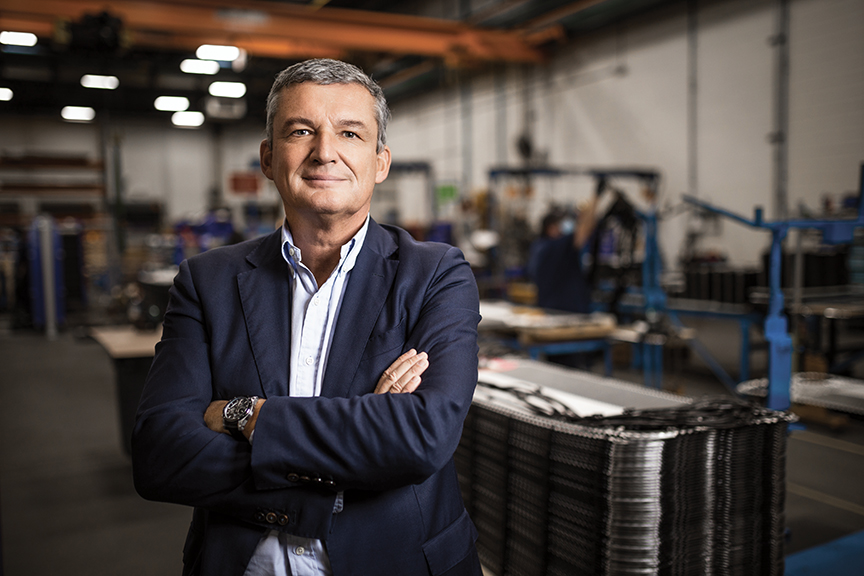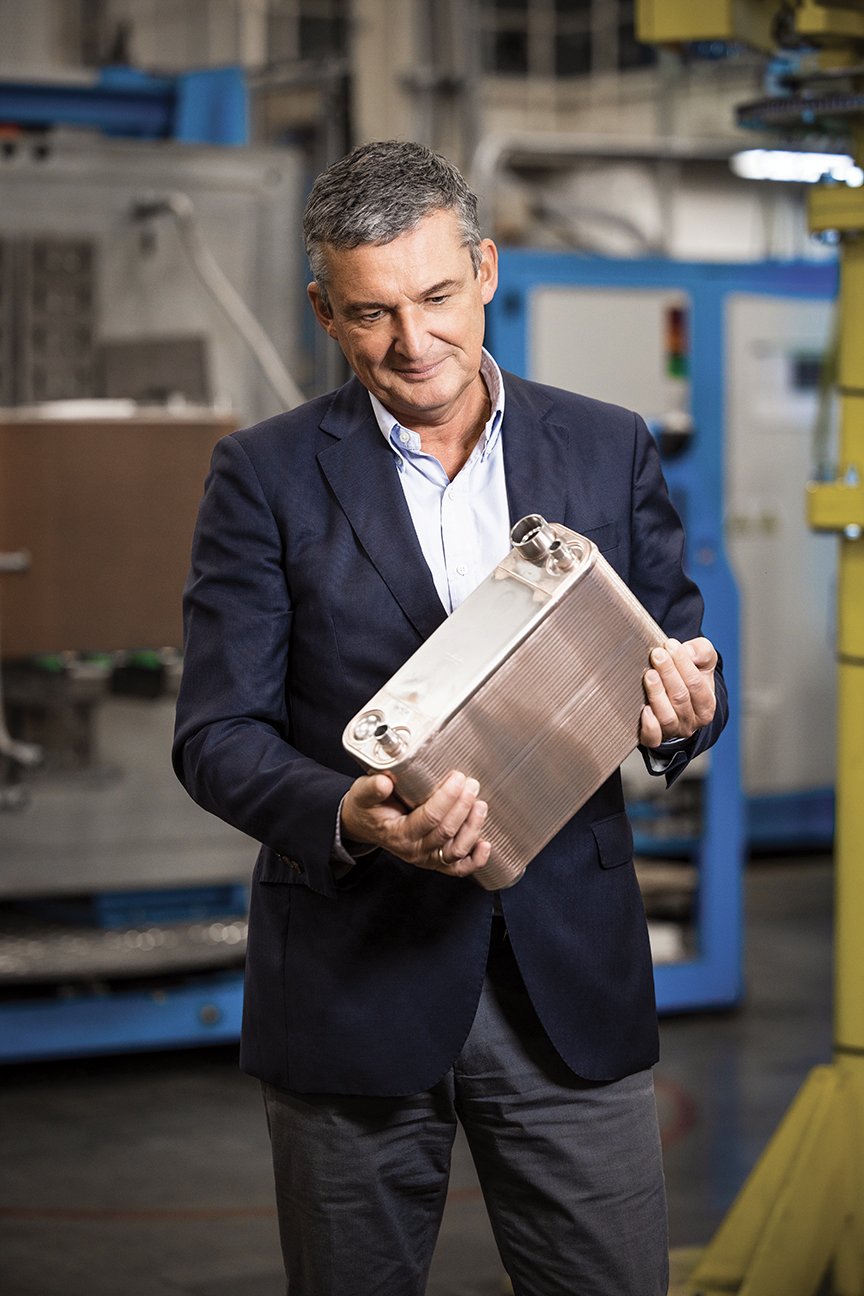Pumped for the Future: Jo Vanhoren
Alfa Laval’s key technologies like heat transfer, separation technology and fluid handling for the food and water, marine and energy markets have always promoted sustainability, says the CEO of Alfa Laval US, Jo Vanhoren. It’s a model that places the business in pole position for the future.
Sustainability may be the new necessity across all industry, but creating products that reduce the pressure on the environment is nothing new for Alfa Laval. "It has always been at the core of what we do," Jo Vanhoren, President and CEO of Alfa Laval US, the American arm of the Swedish-born company, tells The CEO Magazine.

"We’ve always looked for the most efficient products in terms of water and electricity consumption, as well as performance, as we have believed that has the best bottom-line impact for the customer."
For a long time, the model has been something of a handicap, Jo concedes: "If you want to bring that value, sometimes your product is a little bit more expensive than some of your competitors."
But now, the dividends are starting to be felt as its optimized heat transfer, centrifugal separation and fluid-handling pump and valve solutions are exactly what its business-to-business customer base is looking for. "Alfa Laval really has the right products when it comes to sustainability," he says.
Jo adds that this creates something of a win–win situation for everyone. "The beauty of this is that, in the act of contributing to sustainability goals, very often our customers’ processes become more efficient," he explains.
"You can save money and, at the same time, actually reduce the environmental impact." Back in 1883, it was the innovation of the centrifugal milk-cream separator that signaled the start of the Alfa Laval – or AB Separator as it was known until 1963 – journey.
By 1913, when its Founder Gustaf de Laval died at the age of 67, 92 patents had been obtained in Sweden. Today, the company has around 17,500 employees and a presence in more than 50 countries (and sells to double that figure). It’s active in three primary areas: food and water, energy and marine.
The technologies it brings to market promote the purification, refining and re-use of materials, therefore improving energy efficiency, heat recovery and water treatment, all while reducing emissions.

Jo has held numerous positions across various countries since he first started with Alfa Laval in 1989. During this time, the company was acquired by packaging giant Tetra Pak and then sold to London-based investment company IK Investment Partners. Along the way, it has opened factories, acquired businesses and, in 2002, was listed on the Stockholm Stock Exchange (now known as the Nasdaq Stockholm).
"It’s a big journey to be privately owned and then to become part of a private equity firm whose only aim is to put you on the stock market as quickly as possible," he admits, calling the transition years a "difficult period".
"Once we went public, the new Alfa Laval was really launched and we became much more focused on developing ourselves in more industrial markets." From there, the company has gone from strength to strength.
"We have grown over time to become a very stable company that is always reaching its financial objectives. Investors can rely on us as a trustworthy investment," Jo says, adding that the company has undertaken "an exciting growth journey" at the same time. "We’ve done well by focusing on the right applications at the right moments."
In the act of contributing to sustainability goals, very often our customers’ processes become more efficient.
And now, fueled by a global health pandemic which is shifting the general mindset towards protecting the planet and treating resources with care, it would appear to be the right moment to dive even further into sustainability. It’s a move Jo calls Alfa Laval’s "next wave of diversification".
All-Inclusive
Alfa Laval is firmly committed to its diversity and inclusion charter – its workforce represents a mix of 100 nationalities and 20.5% of its management team are female. But the company knows it still has a way to go. "We want even more female leadership in the company," Jo says, revealing that a dedicated talent development program called Impact has been created to identify, retain and develop female talent. "Of course, it’s not only about gender. Every parameter related to diversity is important to us."
Along with connectivity and pharmaceuticals, he sees energy storage as an area of huge opportunity going forward. "We are working on very innovative concepts in thermal energy storage, which will, over the next few years, become interesting commercial solutions," he shares.
Of course, with international treaties such as the Paris Agreement, which sets out a road map to address climate change and limit global warming, there are also those markets that do not exist yet to prepare for. However, this time Jo says Alfa Laval will be doing things differently.
We want to be preferred in the eyes of our customers in terms of the customer experience when interacting with us and the value we provide to them.
"Previously, if we needed a product or wanted to enter another market, we would look for acquisitions," he reveals. And while such a strategy is still "high on the agenda", there are alternate options being explored.
"We’re collaborating much more, partnering with other players to bring us into new fields," he says. "For example, collaborations are ongoing in areas like energy storage, connectivity or food production out of insect protein, just to name a few."
The company has also redistributed its production across its factories in Europe to free up space in facilities such as its Denmark Innovation & Test center for startups to base themselves.
"At the moment, there are around 16 startups that have an office in there. They can use our production machinery to produce prototypes and so on," Jo points out, adding that having innovative thinkers in close proximity also benefits Alfa Laval.
"We are in contact with what they are working on straight from the beginning." As the head of the company’s US operations since March 2018, Jo’s focus in his market is on a "be preferred" strategy.
"We want to be preferred in the eyes of our customers in terms of the customer experience when interacting with us and the value we provide to them," he enthuses. With this in mind, business development, improving sales and ensuring comprehensive coverage of its markets are his targets.
"Last but not least it’s about people and culture," Jo adds. "By that, I mean ensuring our employees are engaged and can see a way to develop themselves and contribute and grow. If people feel they can grow, ultimately the company will also grow."
After years spent concentrating on Alfa Laval’s European and Asian markets, the role is also an opportunity to learn about doing business across the pond.
Efficient Learnings
Jo is based in Richmond, Virginia. He says his team was "well prepared" for the transition to working from home due to COVID-19. "We were already working on the digital transformation, but never expected to be able to implement it so quickly," he says. "From one day to the next, we just had to be up and running. We ensured that our customers weren’t affected and that our supply chains were maintained." Of all the learnings to come out of the global pandemic, he predicts that efficiency will be the most crucial. "We are moving to the next level where digitalization and digital tools will become even more important, not just to interact, but to also take over much of the repetitive tasks," he predicts. "In my opinion, the efficiency game is going to be brutal because the pandemic has taught us that we can suddenly become so much more efficient. It won’t stop here. It will be a battle for efficiency going forward."
"There is a win–win mentality in the US where customers and suppliers typically try to work with each other as partners and ensure that both sides benefit. The perspective is more long-term," Jo explains.
"Whereas the further south you head in Europe, sometimes you find yourself in a win–lose situation where, if customers knew that suppliers were making money, they would probably negotiate harder to get a better deal. The outlook is more short-term."
The approach may be different, but whichever side of the Atlantic – or wherever in the world – its clients are located, the core premise of Alfa Laval remains the same. "Our products make the difference in our customer processes and are a great contributor to sustainability," Jo says. And in 2021, that’s exactly where it wants to be. "We are very well positioned for the future."
Proudly supported by: